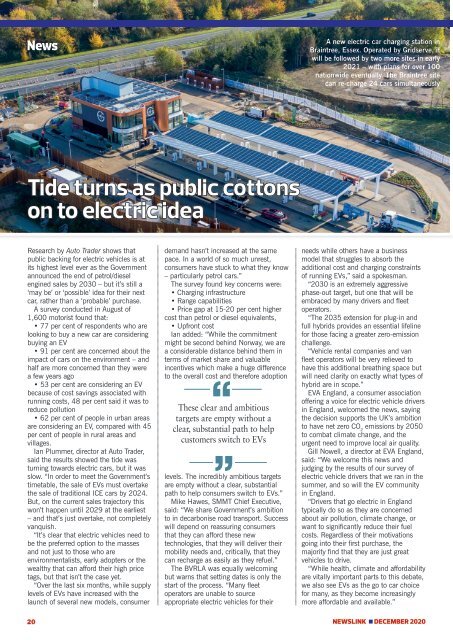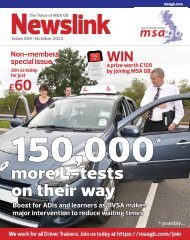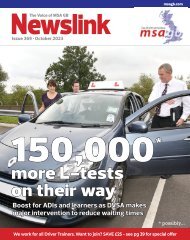You also want an ePaper? Increase the reach of your titles
YUMPU automatically turns print PDFs into web optimized ePapers that Google loves.
News<br />
A new electric car charging station in<br />
Braintree, Essex. Operated by Gridserve, it<br />
will be followed by two more sites in early<br />
2021 – with plans for over 100<br />
nationwide eventually. The Braintree site<br />
can re-charge 24 cars simultaneously<br />
Tide turns as public cottons<br />
on to electric idea<br />
Research by Auto Trader shows that<br />
public backing for electric vehicles is at<br />
its highest level ever as the Government<br />
announced the end of petrol/diesel<br />
engined sales by 2030 – but it’s still a<br />
‘may be’ or ‘possible’ idea for their next<br />
car, rather than a ‘probable’ purchase.<br />
A survey conducted in August of<br />
1,600 motorist found that:<br />
• 77 per cent of respondents who are<br />
looking to buy a new car are considering<br />
buying an EV<br />
• 91 per cent are concerned about the<br />
impact of cars on the environment – and<br />
half are more concerned than they were<br />
a few years ago<br />
• 53 per cent are considering an EV<br />
because of cost savings associated with<br />
running costs, 48 per cent said it was to<br />
reduce pollution<br />
• 62 per cent of people in urban areas<br />
are considering an EV, compared with 45<br />
per cent of people in rural areas and<br />
villages.<br />
Ian Plummer, director at Auto Trader,<br />
said the results showed the tide was<br />
turning towards electric cars, but it was<br />
slow. “In order to meet the Government’s<br />
timetable, the sale of EVs must overtake<br />
the sale of traditional ICE cars by 2024.<br />
But, on the current sales trajectory this<br />
won’t happen until 2029 at the earliest<br />
– and that’s just overtake, not completely<br />
vanquish.<br />
“It’s clear that electric vehicles need to<br />
be the preferred option to the masses<br />
and not just to those who are<br />
environmentalists, early adopters or the<br />
wealthy that can afford their high price<br />
tags, but that isn’t the case yet.<br />
“Over the last six months, while supply<br />
levels of EVs have increased with the<br />
launch of several new models, consumer<br />
demand hasn’t increased at the same<br />
pace. In a world of so much unrest,<br />
consumers have stuck to what they know<br />
– particularly petrol cars.”<br />
The survey found key concerns were:<br />
• Charging infrastructure<br />
• Range capabilities<br />
• Price gap at 15-20 per cent higher<br />
cost than petrol or diesel equivalents,<br />
• Upfront cost<br />
Ian added: “While the commitment<br />
might be second behind Norway, we are<br />
a considerable distance behind them in<br />
terms of market share and valuable<br />
incentives which make a huge difference<br />
to the overall cost and therefore adoption<br />
‘‘<br />
These clear and ambitious<br />
targets are empty without a<br />
clear, substantial path to help<br />
customers switch to EVs<br />
‘‘<br />
levels. The incredibly ambitious targets<br />
are empty without a clear, substantial<br />
path to help consumers switch to EVs.”<br />
Mike Hawes, SMMT Chief Executive,<br />
said: “We share Government’s ambition<br />
to in decarbonise road transport. Success<br />
will depend on reassuring consumers<br />
that they can afford these new<br />
technologies, that they will deliver their<br />
mobility needs and, critically, that they<br />
can recharge as easily as they refuel.”<br />
The BVRLA was equally welcoming<br />
but warns that setting dates is only the<br />
start of the process. “Many fleet<br />
operators are unable to source<br />
appropriate electric vehicles for their<br />
needs while others have a business<br />
model that struggles to absorb the<br />
additional cost and charging constraints<br />
of running EVs,” said a spokesman.<br />
“2030 is an extremely aggressive<br />
phase-out target, but one that will be<br />
embraced by many drivers and fleet<br />
operators.<br />
“The 2035 extension for plug-in and<br />
full hybrids provides an essential lifeline<br />
for those facing a greater zero-emission<br />
challenge.<br />
“Vehicle rental companies and van<br />
fleet operators will be very relieved to<br />
have this additional breathing space but<br />
will need clarity on exactly what types of<br />
hybrid are in scope.”<br />
EVA England, a consumer association<br />
offering a voice for electric vehicle drivers<br />
in England, welcomed the news, saying<br />
the decision supports the UK’s ambition<br />
to have net zero CO 2<br />
emissions by 2050<br />
to combat climate change, and the<br />
urgent need to improve local air quality.<br />
Gill Nowell, a director at EVA England,<br />
said: “We welcome this news and<br />
judging by the results of our survey of<br />
electric vehicle drivers that we ran in the<br />
summer, and so will the EV community<br />
in England.<br />
“Drivers that go electric in England<br />
typically do so as they are concerned<br />
about air pollution, climate change, or<br />
want to significantly reduce their fuel<br />
costs. Regardless of their motivations<br />
going into their first purchase, the<br />
majority find that they are just great<br />
vehicles to drive.<br />
“While health, climate and affordability<br />
are vitally important parts to this debate,<br />
we also see EVs as the go to car choice<br />
for many, as they become increasingly<br />
more affordable and available.”<br />
20<br />
NEWSLINK n DECEMBER 2020

















